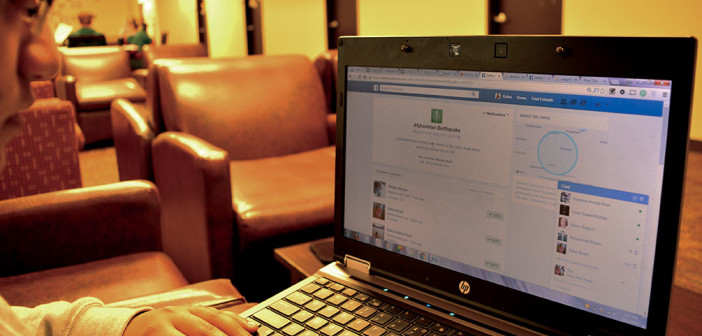Waking up to bad news is never a good omen for the rest of your day, especially if it’s a Monday. When I woke up on Monday, October 26, I did what every youngster does first thing in the morning: I checked my phone. It was through social media that I first came to know about the devastating earthquake that had hit my home country, Pakistan.
Monday morning in Naperville, Ill, was Monday evening in Pakistan, due to the 10-hour time difference. The earthquake had hit the Pak-Afghan belt at 1:39 p.m., Pakistan Standard Time.
Facebook was, for once, a tool which not only reduced my anxiety greatly, but also probably collected some valuable data. The “Marked Safe” feature that they quickly added to the status box was a blessing as almost all friends gradually marked themselves safe.
Every notification was met with a sigh of relief from me, but that didn’t mean everyone was lucky enough to survive the magnitude-6.7 earthquake. That is, at least, the most popular number consensus, with other candidates being magnitude 8.1 and magnitude 8.5. Just like the magnitude of the quake changes depending on who you asked, and what media outlet you accessed, the death toll is also still not agreed upon. The latest reports suggest it has risen above 300 casualties in Pakistan alone.
I called my family and texted some friends who I knew could have been in the worst-hit northern province: Khyber Pakhtunkhwa. The ones who didn’t reply back caused me worry. A hint of anger emerged. They knew I was in another country, they should have replied immediately to my worried texts.
I soon found out the reason for the delayed communication when my Facebook Messenger call finally got through to my sister. The Internet and phone services were out for a while; the earthquake had damaged poles and antennae. When the earthquake struck, my family had been scattered all over the city of Rawalpindi. They couldn’t get in contact with one another for some time. My sisters, who work as counselors in an elite private school, finally got through to my father using Facebook Messenger and everyone was reassured that all family members were alright.
When I called home, they were all there, safe and sound in the house we have called home for 16 years, and which has been through not one, but two, major earthquakes. I have been told that there were no new cracks in the plaster this time.
From the time when I woke up, to kind of floating through my 10:40 a.m. class, to asking other Pakistanis in the United States if their families were alright, to answering Americans’ concerned questions, I was emotionally exhausted by noon.
I felt helpless in a foreign country while so much happened at home. I couldn’t get credible news. Different websites gave their own death count and magnitude of the quake. Different American newspapers gave their own twists to the news.
The New York Times on Tuesday proclaimed that the quake “multiplies war woes” for Afghanis and Pakistanis. I failed to see the connection to war in my opinion, and in fact. We are not “at war” in the first place. We are carrying out a meticulously planned and executed military operation in the North, getting rid of the vermin who infiltrated our border with Afghanistan: the Taliban.
The last blow was the news about those same Taliban, the same subhuman extremists we have been fighting against for the last decade, stepped up to undertake relief efforts and urged others to do the same. It shocked and annoyed me that such parasites had the gall to urge our government to save the same people they were okay with killing just a couple of days ago. The American media, of course, picked up the news with fervor, and I don’t blame them one bit.
Now that the initial frenzy has settled down, the focus has shifted to the destroyed homes, landslides and mudslides, damaged infrastructure and panicked relief efforts in the country. The immensely respected and able Pakistan military is, once more, at the helm of rescue operations.
The mass burials and crowded hospitals are the chosen stages of heart-wrenching scenes playing in the media. The brunt of the socially and economically crippling blow was absorbed by the northern parts of Pakistan, the areas closest to the mountain ranges, of which we have many. This particular earthquake took place in the Hindu Kush mountain range, an offshoot of the Himalayas. If the epicenter of the quake had not been deeper under the surface, or at the Afghan side of the mountains, the damage would have been even more devastating.
I feel a sense of detached sympathy for the victims, the physical damage and the shattered morale of my fellow countrymen. But I want to feel more, like I would have if I had been back home. The effect of geographical proximity on emotions is astounding; I cannot feel, simply because I am not there.

